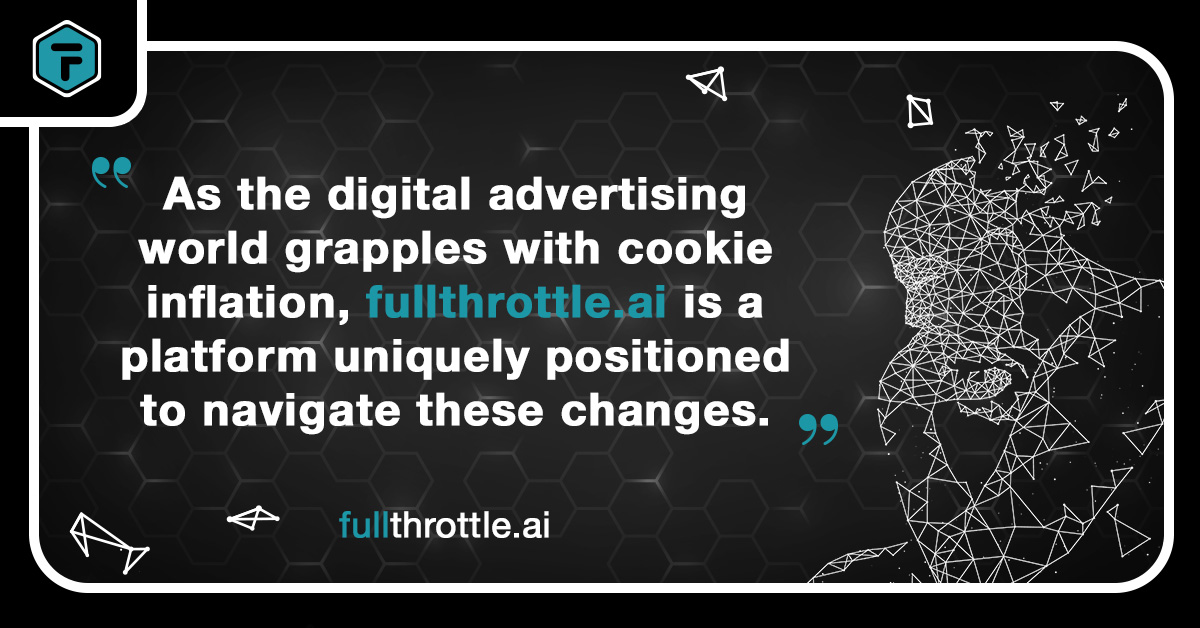
How To Protect Yourself From Cookie Inflation
In an unprecedented move, Google Chrome implemented its Tracking Protection feature for 1% of its users globally, setting the stage for the complete phase-out of third-party cookies by the end of 2024. This development has fundamentally altered the terrain of digital advertising, introducing the industry to a new challenge: cookie inflation.
Key takeaways:
- Cookie inflation results from the increasing scarcity of third-party cookies, leading to higher costs for advertisers as the inventory for cookie-based targeting dwindles.
- The phase-out of third-party cookies by Google Chrome, through the introduction of Tracking Protection, necessitates a shift towards privacy-centric advertising solutions.
- fullthrottle.aiTM offers a resilient approach to digital advertising in the face of cookie inflation, leveraging household-level targeting and patented technology to ensure effectiveness and privacy compliance.
What Is Cookie Inflation?
Cookie inflation refers to the rise in the cost per mille (CPM) impressions as third-party cookies become increasingly scarce. Before we dive into that, let’s back up in case you need a refresher on what a third-party cookie is.
What Are Third-Party Cookies?
Third-party cookies are small text files that websites give your browser to track your behavior on other websites. Most browsers have stopped using them, but Chrome (which holds 70% of the browser market) was the last one standing. Then, the other shoe dropped: Google announced they were deprecating third-party cookies for 1% of users in January 2024, scaling up to 100% by the end of the year.
The initial test phase is only the beginning of a comprehensive plan to comply with new privacy legislation and user sentiment. However, it also signals a tightening of the resources advertisers have long relied on for targeting and measurement. This scarcity is the driving force behind cookie inflation, pushing up advertising costs as the available inventory for cookie-based targeting diminishes.
Google Chrome's Tracking Protection and Third-Party Cookie Scarcity
The feature that blocks third-party cookies on Chrome is called Tracking Protection. With that feature turned on for this initial test group, Chrome has taken a significant step toward eliminating third-party cookies. This action has raised numerous questions about the future of digital advertising and the tools marketers will need to reach their audiences. As the percentage of users blocking cookies increases throughout the year, bids for ads that use third-party cookies will get tougher, forcing a massive pivot towards new, privacy-centric solutions. In a sentence: The age of bargain basement CPMs is over.
Will You Be Affected by Cookie Inflation?
The consequences of cookie inflation are far-reaching, impacting various aspects of digital advertising from budget allocation to campaign execution.
Cost Implications and Auction Dynamics
Advertisers will soon feel the pinch as the cost of available third-party cookie inventory starts to climb. This inflation is a direct result of reduced access to third-party cookies, leading to heightened competition for a dwindling resource. As the phase-out continues, this trend is expected to intensify, reshaping the economics of digital advertising and forcing a reevaluation of budgeting and bidding strategies. If your brand hasn’t found alternatives, now is the time.
Targeting, Measurement, and Industry Challenges
Since advertisers can’t rely on third-party cookies anymore, they will have to find other methods that respect user privacy while delivering measurable results. As ADWEEK reported, many AdTech firms that built their platforms on cookies will be lucky if they make it through the year. Agencies and brands need tools that can provide the same level of granularity and effectiveness without infringing on consumer privacy. It’s a significant hurdle for the industry, one that will cause lasting damage without innovative thinking and rapid adaptation.
Why fullthrottle.aiTM Is Inflation-Proof
As the digital advertising world grapples with the ramifications of cookie inflation, fullthrottle.aiTM is a platform uniquely positioned to navigate these changes.
Embrace Household-Level Targeting
fullthrottle.aiTM leverages patented technology to offer household-level identification and targeting, using a methodology that bypasses the need for third-party cookies while upholding privacy standards. Our platform helps brands build first-party data they can actually use, and the cookieless tech it’s built on keeps it fully insulated from cookie inflation.
Pushing a Sustainable Digital Advertising Future
fullthrottle.aiTM is at the forefront of developing a sustainable digital advertising ecosystem that thrives in a post-cookie world. We not only protect advertisers from the effects of cookie inflation, but also set a new standard for ethical and effective audience generation, immersive household marketing, and true attribution.
The deprecation of third-party cookies in Google Chrome has ushered in the era of cookie inflation, and it is not without its challenges. The path forward requires a collective shift towards more sustainable advertising practices — but that doesn’t mean it has to be less effective. If you want to build first-party data that powers your marketing engine better than cookies ever did, book a demo and future-proof your marketing.


